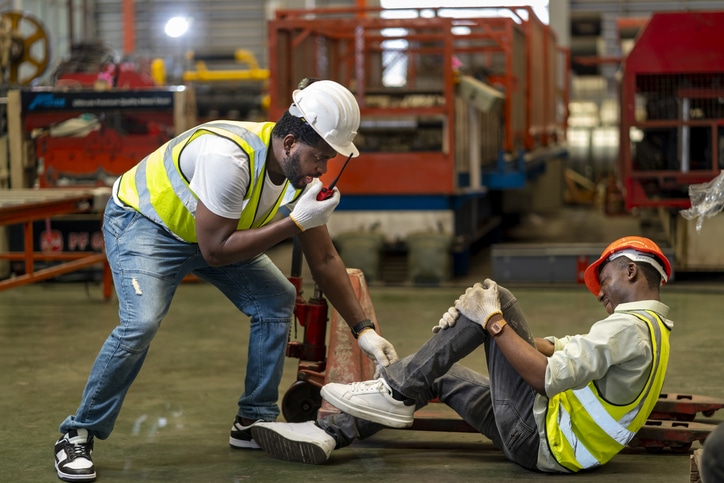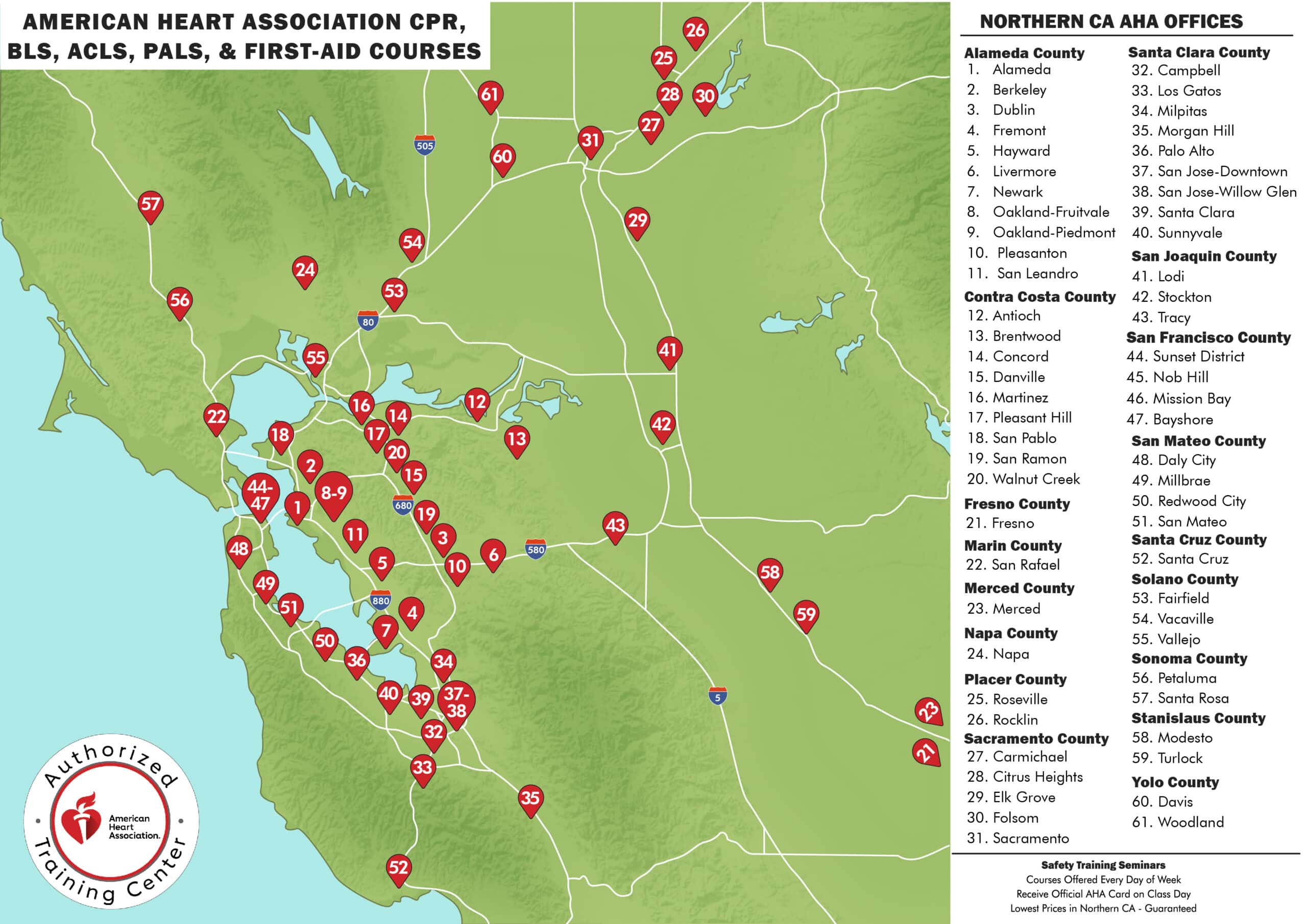American Heart Association© CPR & First-aid Classes in San Rafael

CPR, AED, And First-aid
Course Name: CPR and First-aid
Online Course Length: About 2 hours (At your home.)
Skills Testing: 40 minutes at one of our over 60 CPR testing sites.
Description: CPR (all ages), AED, bleeding, burns, seizures, epi-pen, etc
Price: $140 (Includes the online CPR & First-aid course, skills testing, & card.)
Certification: American Heart Association
When: CPR & First-aid classes are offered every day of the week.
Card Issuance: You will receive the certification card on day of class.
Childcare Licensing: This certification card is valid for CA childcare providers.
Add ons available: Opioid Training, or Bloodborne Pathogens
Low Price Guarantee: Lowest prices in San Rafael. Price matching policy.
CPR & First-aid Courses Near Me in San Rafael & Other Cities
Store locator is loading from StoreRocket Store Locator App..

CPR & First-aid Certification Classes in San Rafael: Empowering Communities Through Lifesaving Skills
Cardiopulmonary resuscitation (CPR) and first-aid are essential skills that can mean the difference between life and death in emergencies. In San Rafael, California, American Heart Association (AHA) CPR & First-aid certification classes are available to individuals and organizations, providing them with the knowledge and skills necessary to respond effectively to medical emergencies. This article explores the importance of CPR & First-aid certification, the offerings of the American Heart Association in San Rafael, and the impact these classes have on community safety and well-being.
The Importance of CPR & First-aid Certification
Cardiac arrest and other medical emergencies can happen anytime, anywhere. Immediate intervention with CPR and first-aid can significantly improve the chances of survival and reduce the risk of long-term disability. CPR & First-aid certification classes teach participants how to recognize and respond to medical emergencies, including heart attacks, strokes, and injuries.
CPR & First-aid certification goes beyond basic first-aid skills, teaching participants how to perform high-quality CPR, use an automated external defibrillator (AED), and provide care for choking victims. These classes also emphasize the importance of early recognition and early intervention, which are crucial for improving outcomes in medical emergencies.
The American Heart Association’s Commitment to Community Safety
The American Heart Association is a global leader in cardiovascular research, education, and advocacy. Committed to reducing the impact of heart disease and stroke, the AHA offers CPR & First-aid certification classes in San Rafael to empower individuals and organizations to respond effectively to medical emergencies.
In San Rafael, the AHA collaborates with local healthcare providers, schools, businesses, and community organizations to make CPR & First-aid certification classes accessible to residents. These classes are taught by certified instructors who provide hands-on training and real-world scenarios to ensure participants are prepared to respond confidently in emergency situations.
Comprehensive Offerings of CPR & First-aid Certification Classes
The CPR & First-aid certification classes offered by the American Heart Association in San Rafael cater to a diverse range of participants, including healthcare professionals, teachers, childcare providers, and members of the general public. The curriculum covers essential topics such as adult, child, and infant CPR, AED use, relief of choking, and first-aid for common injuries.
Participants in CPR & First-aid certification classes engage in hands-on practice and interactive simulations to reinforce their skills and build confidence in their ability to respond to emergencies. The AHA also offers refresher courses and online resources to help participants maintain their skills and stay up-to-date with the latest guidelines.
Impact on Community Safety and Well-Being
The impact of CPR & First-aid certification classes extends beyond individual participants to the community at large. By equipping individuals with the skills to respond effectively to medical emergencies, these classes help create a safer and more resilient community. In emergencies, trained individuals can provide immediate care while waiting for professional help to arrive, potentially saving lives and reducing the severity of injuries.
Moreover, CPR & First-aid certification classes foster a culture of preparedness and responsibility. Participants not only learn how to respond to emergencies but also become advocates for safety and well-being in their communities. By promoting the importance of CPR & First-aid certification, individuals can inspire others to take action and become trained in lifesaving skills.
Conclusion
In San Rafael, California, CPR & First-aid certification classes offered by the American Heart Association play a crucial role in empowering individuals and communities to respond effectively to medical emergencies. By providing participants with the knowledge and skills necessary to perform CPR and first-aid, these classes contribute to community safety and well-being. Through education, advocacy, and collaboration, the AHA and its partners in San Rafael strive to create a more prepared and resilient society, where every individual has the potential to be a lifesaving hero.
FAQs
Who should attend CPR & First-Aid certification classes in San Rafael?
CPR & First-Aid certification classes are suitable for anyone who wants to learn life-saving skills, including parents, teachers, caregivers, healthcare professionals, and members of the general public.
How long does a CPR & First-Aid certification course typically last?
CPR & First-Aid certification courses usually span over one to two days, depending on the training provider. The course includes a combination of classroom instruction, skills practice, and hands-on demonstrations.
Is there a renewal requirement for CPR & First-Aid certification?
Yes, CPR & First-Aid certifications are typically valid for two years, after which individuals are required to undergo renewal courses to maintain their certification. Renewal courses often include updates on guidelines and practice of skills.
